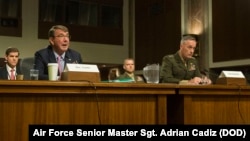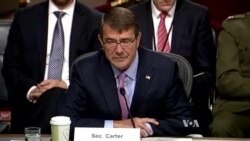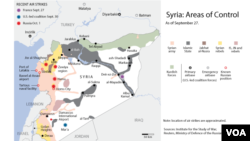The United States says it is stepping up its attacks against Islamic State targets in Syria and Iraq, with more airstrikes and possibly ground assaults.
Defense Secretary Ash Carter told a congressional hearing on the American military strategy in the Middle East on Tuesday there could be more raids like the one last week in which U.S. troops advised Kurdish forces on the rescue of about 70 hostages in Iraq, even as a U.S. commando was killed.
"We won't hold back from supporting capable partners in opportunistic attacks against (the Islamic State), or conducting such missions directly, whether by strikes from the air or direct action on the ground," said Carter.
He did not say under what circumstances the U.S. might engage in ground combat, but said that "once we locate them, no target is beyond our reach."
Watch: Related TV report by Michael Bowman:
President Barack Obama has so far ruled out the use of American ground troops in Iraq and Syria, after pulling out ground forces from Iraq in 2011 before launching an air campaign last year in the two countries against Islamic State insurgents.
Carter and Marine Corps General Joseph Dunford, the chairman of the Joint Chiefs of Staff, acknowledged to lawmakers that the U.S. is struggling to combat the Islamic State forces.
"No one is satisfied with our progress to date," Dunford told the Senate Armed Services Committee.
Carter said he was "disappointed" in the failure of a $500 million U.S. effort to train moderate rebel forces in Syria to fight against the Islamic State. The United States abandoned the program earlier this month after only a few soldiers had been trained.
In response, Carter said the United States has intensified its aerial campaign against the Islamic State in hopes of shrinking its hold on Raqqa in northern Syria, the headquarters of its operations.
At the same time, Dunford said U.S. military leaders were "frustrated by the pace of operations" in assisting Iraqi forces retake vast swaths of territory in their country that the Islamic State took control of as it created a caliphate in northern Iraq and Syria.
Senator John McCain, the committee's chairman and a long-time critic of U.S. military policies in the Middle East, said Obama was overseeing a failed effort in the region and has "not even defined the problem correctly."
McCain said, "Our policy of ISIL (an acronym for the Islamic State) first fails to understand that ISIL, for all of the threat it poses, is actually just a symptom of a deeper problem, the struggle for power and sectarian identity now raging across the Middle East, the epicenter of which is Iraq and Syria."
McCain, who was defeated by Obama in the 2008 presidential election, said, "We've tried to leave the Middle East. Now into this vacuum has stepped [Russian President] Vladimir Putin," with Russia conducting an aerial campaign against rebel groups fighting Syrian troops loyal to President Bashar al-Assad.
"We hear it said all the time, there is no military solution about ending the four-year Syrian conflict, which is a truism," said McCain. "But that too is misleading. The real problem is there can be no diplomatic solution without leverage and there is a clear military dimension to this problem."
No-Fly Zone
He chided Carter for not recommending Obama adopt a no-fly zone over Syria to keep Syrian and Russian air strikes from hitting rebel forces loyal to the United States, with Assad's fighter jets dropping barrel bombs that have killed thousands of civilians.
McCain said that with Moscow's involvement in Syria, "the U.S. is now moving out of the way." He called the U.S. actions in Syria, "not only harmful to our interests, it is immoral."
He said Russia would become "the dominant military power in the Middle East."
Dunford said Iraqi Prime Minister Haider al-Abadi assured him last week that it would not invite Russia to conduct an air campaign in Iraq. Carter said the U.S. was "not cooperating" with Russia's Syrian air attacks on the Assad opposition.
But Senator Tom Cotton, another critic of U.S. actions in the Middle East, criticized the U.S. military chiefs for not pressing Iraq to end Baghdad's approval of Russian military flights over Iraq as Moscow conducts its Syrian campaign.
Despite the U.S. setbacks, Carter vowed, "We will deliver a lasting defeat" to the Islamic State insurgents.
Some material for this report came from AP and AFP.







